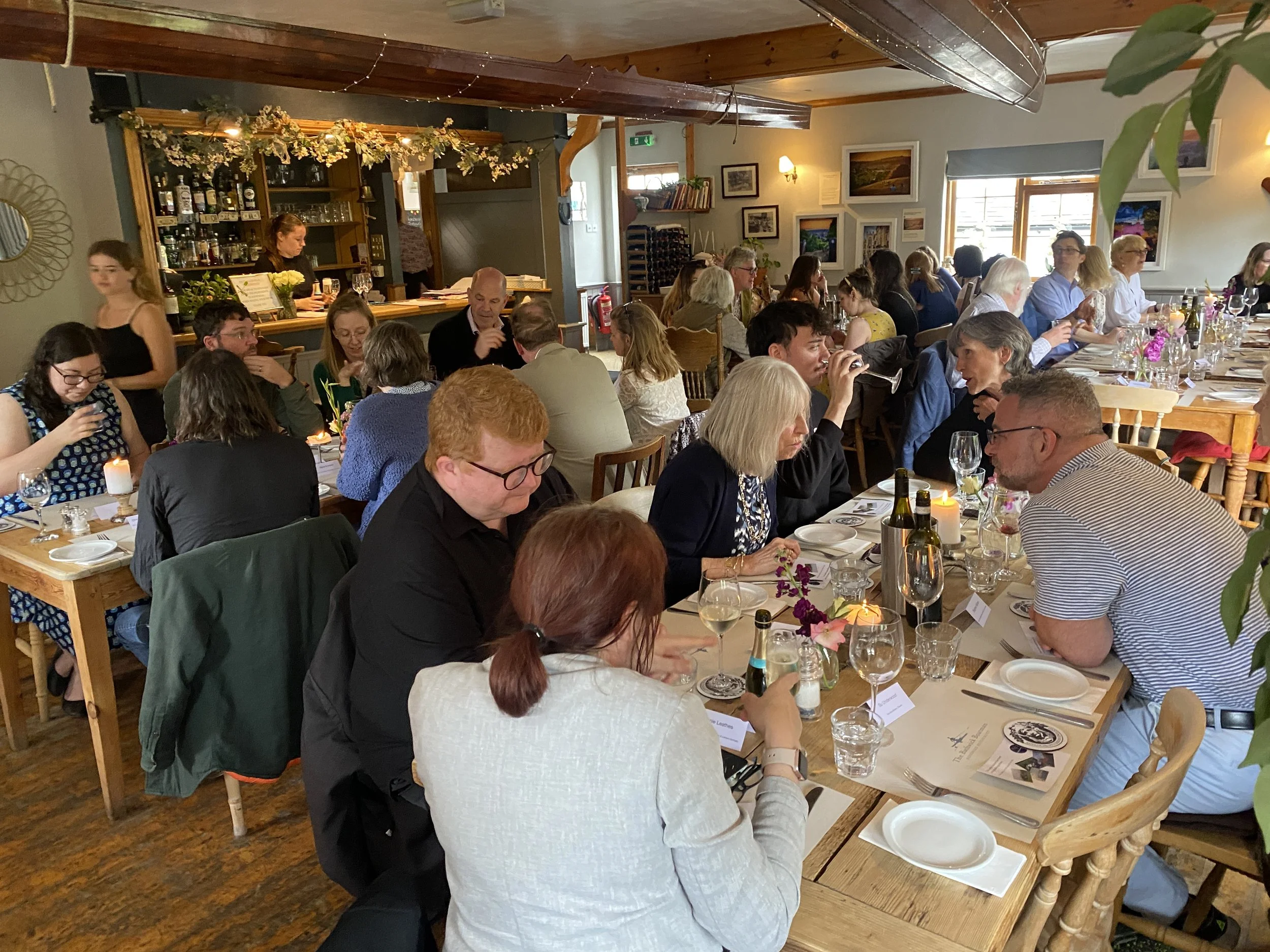All Things ASE
ASE: A Unique Community.
As ASE celebrated its 35th anniversary this weekend, the celebrations were attended by a community of faculty, alumni, and friends that is unique in study abroad. ASE’s Alumni Association Coordinator considers what makes it so special.
The attendees of ASE’s 35th anniversary luncheon -staff, alums, faculty and friends.
It fell to me to decide the seating arrangements for our thirty-fifth-anniversary luncheon. The experience was akin to that of planning a wedding reception. Sixty-six people, with varying connections and relationships, and the all-important top table.
Thankfully, I didn’t have to worry about not sitting Aunty Doris next to Aunt Gene (you know, after what they said about cousin Gerald at that Thanksgiving Dinner back in ‘93), and, whilst there was no bride, groom, best man, or father of the bride who had to be on the top table, there were still certain folks (the Dean and Director of the programme, for example) who clearly belonged there.
What I did have to do was to try a seemingly diverse group of people to ensure that everyone had someone with whom they had at least something vaguely in common. This was both quite hard and, at the same time, remarkably easy.
It was hard because of the number of different backgrounds folks came from. We had alums from the last twenty-five years - in this case from 1999 through to 2023 - as well as partners, fathers, mothers, and grandmothers. We had current and former ASE staff, UK and US faculty past and present, folks from the study abroad offices back in the US, and local supporters of the programme from Bath Spa University and elsewhere.
How was I to make sure that all of these different people, of different ages, backgrounds and interests, sat with someone with whom they had something in common?
It was somewhat easier than one might think. I could pair up alums who had been taught by the tutors, or who had come from the same colleges. On one table an alum and two of our tutors talked animatedly about the trials and tribulations of working in theatre. On another one of our creative writers chatted with two of their former students, the latter separated by a decade. On a third, two ASE staff shared anecdotes about their experiences running ASE’s social and cultural programme, whilst opposite them a former director of study abroad empathised on the difficulties of wrangling students. All across the room new friendships were forged, and old acquaintances renewed.
It’s a strength of ASE that its different community members share such a strong bond, forged through a shared experience of the programme.
Of course, underpinning it all, and providing a common touchstone for everyone there, was ASE itself. As Sue Mennicke, Associate Dean of International Initiatives at Franklin and Marshall College, said, ASE is unique in the breadth of supporters and friends that the programme has, and the strength of the affection they hold for it.
It’s hard to fix on exactly what it is about the programme that creates such a warm, fuzzy feeling in so many.
For the alums the shared experience within and between the semesters is a large part of it. The programme has remained remarkably unchanged in its three-decade history. Students have all gone through the green (originally white) front door of Nelson House, our study centre, for their classes. Many of those classes are ostensibly the same, albeit that their syllabuses and subject matter have been brought up to date with the latest scholarship. They have lived in the same houses, shared the same rooms, even the same beds (although not at the same time!). All of the students have stayed at University College, Oxford (if they came for the semester) or on the English coast - Cornwall or, more latterly, Dorset (if they were part of the summer school). In their five-week summer or fifteen-week semester they have come to look on Bath as their home, and most have taken into their hearts, and kept it there when they have gone back to the States.
Punting in Oxford Spring ‘90 and Spring ‘24. The shared experiences of alums across the semesters helps foster the friendships within the alumni community.
The UK and US faculty who have taught have shared in much of this. Our US summer tutors (and their families) get to join the trip to the coast, and live in the city too. All of our tutors get to teach courses in subjects they love to small classes of bright, engaged students, for whom everything is new and exciting. That kind of energy is infectious, and I know the staff feel that too.
The small size of the cohort (fifty-nine students last semester was our largest cohort for a very long time) and of the ASE team (this autumn we will become twelve in number; another record) also contributes. Everybody has the opportunity to get to know everybody. All of the staff are actively involved in the pastoral care of the students, and in providing logistical support for the study trips, and social and cultural excursions. The students have that sense that they are seen, and cared about. They have their own space, are treated as adults but, equally, when they need us, they know that we are there for them. The sense of community that this builds between the students, and also between them, the team, and their tutors, is remarkable.
For those outside the ASE experience - the study abroad staff on the US campuses, and the faculty who support the programme without ever having taught for it, and the partners, parents, grandparents and siblings - I think the interest and enthusiasm is gained by a from of osmosis. They see how the alums come back enthusing and excited by the experience they have had. They hear the stories about where they’ve been and what they have done and experienced. They see the affection in which ASE is held, and it rubs off on them.
ASE is a remarkable institution in so many ways. As Ann Nunes, former Director, and wife of the programme’s founder Don, wrote ‘It is wonderful to feel that ASE is so firmly rooted in Bath and also spread imaginatively in the minds and hearts of so many people across the globe!
Don, in his last message to students and staff at ASE, said that he thought of ASE as ‘our extended family’ and I think he would be very happy to see the way the family is flourishing’.
The Spring ‘91 students (with Don in the centre back, sporting the brown and gold hat) enjoying a medieval feast at Caldicot Castle. ASE’s unique sense of community came from Don’s vision, and remains very much the same to this day.
Alums and Friends of ASE can ensure they stay in touch by registering for free access to the Alumni Association pages of our website.




